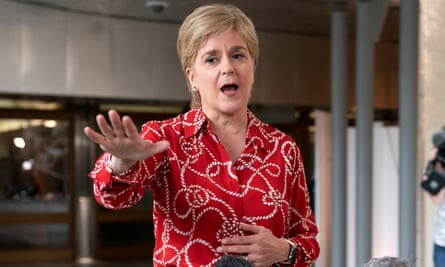When Humza Yousaf stood to address the first substantial gathering of the SNP since he replaced Nicola Sturgeon as leader, he acknowledged the turmoil that is engulfing the party head on.
After the SNP was rocked by the arrests of senior figures, including Sturgeon herself, as part of Police Scotland’s investigation into party finances, he told activists meeting in Dundee for a one-day convention to discuss independence strategy: “You may have picked up there have been a few challenges.” The hall responded with nervous laughter.
Almost immediately after this, it was an unscripted intervention that set the tone for the day. A visibly distressed woman, who described herself as a former patient of the disgraced Tayside doctor Sam Eljamel, started shouting from the audience, demanding a public inquiry into the neurosurgeon.
The interruption was initially booed by other activists but Yousaf paused the keynote speech setting out his own preferred independence plan, walked off the stage into the hall and comforted the woman. A lifelong SNP member, Theresa Mallett, 61, from Glenrothes, told him she was left with life-changing injuries after undergoing botched surgery and has now quit the party.
Returning to the stage after this hiatus, Yousaf told members: “We will not shout people down, we will not boo them, we will listen!”
It was, said allies, a measure of the man whose early tenure has been overshadowed by internal strife largely not of his own making.
Critics were notable by their absence, with a far from full complement of parliamentarians from Westminster or Holyrood present at Caird Hall, itself a more modest venue than the party has inhabited for recent conferences.
The convention had already been dismissed as a cosmetic exercise by some because it is not a decision-making event: after a summer of pro-independence activism and further regional assemblies to discuss the plan, members will have to wait to vote on strategy at their annual conference in October.

There were also warnings from the wider Yes movement that the party leadership must not take a “business as usual” approach, with activists reporting frustration at the lack of progress and need for a rethink of strategy in the face of repeated refusals by Westminster to sanction a second independence referendum.
And the event garnered criticism from Holyrood opposition parties, who accused the SNP of being self-indulgent as domestic and global crises mounted up, as well as their acknowledged need to focus on internal reform after damaging revelations over transparency and governance.
The event may have been more muted in tone, with none of the eruptions of applause, music and hoopla that accompanied Sturgeon-led events, but members described a “definite buzz” on the day, as well as a relief that “the SNP family” was together again after weeks of damaging headlines and bracing polls suggesting that Scottish Labour is on course to win back a fistful of seats from the Nationalists.
And inevitably there was delight at the prospect of actually talking about independence strategy – a topic that had been kept at arm’s length at the previous conference amid internal criticism of Sturgeon’s more cautious, centrist approach – rather than having policy handed down.
But in the end this is what appeared to happen, with most parliamentarians addressing the hall treating Yousaf’s proposition as a fait accompli.
after newsletter promotion
And almost immediately the conversation became mired in confusion about what precisely the new leader had announced as his favoured option, with the focus back on process rather than the policies that would build sustained support for independence, which Yousaf himself has said he wants to focus on.
In a speech that was certainly open to interpretation, Yousaf said a win at the next general election would be a mandate to apply further pressure on Westminster for the powers to hold another referendum. This appeared to be a significant retreat on the de facto plan put forward by Sturgeon after the supreme court ruled last October that Holyrood could not hold a second vote without Westminster’s consent.
Sturgeon had suggested that if more than half of votes were cast for parties in favour of independence, the Scottish government would regard that as a mandate to pursue negotiations.
But Yousaf clarified that a win in Scotland would be measured in terms of parliamentary seats rather than percentage of votes, and that success would mean yet again pressing whichever party was in Downing Street for the means to hold a second vote, despite Conservative and Labour leaderships doubling down on their opposition to a second independence referendum in the run-up to a likely general election next year.
There was apparent confusion about what the plan meant precisely, even among senior parliamentarians – with the veteran MP Pete Wishart and the SNP leadership contender Ash Regan suggesting that the proposal was indeed a full-on de facto proposition.
In the hall, contributions from branch members likewise reflected a plurality of interpretations, and to that extent Yousaf’s speech was a success in that every listener was able to find something in it that appealed to them.
Join the exciting world of cryptocurrency trading with ByBit! As a new trader, you can benefit from a $10 bonus and up to $1,000 in rewards when you register using our referral link. With ByBit’s user-friendly platform and advanced trading tools, you can take advantage of cryptocurrency volatility and potentially make significant profits. Don’t miss this opportunity – sign up now and start trading!






Recent Comments